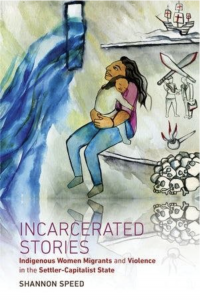
Shannon Speed is a citizen of the Chickasaw Nation. She is Director of American Indian Studies and Associate Professor of Gender Studies and Anthropology at UCLA. Dr. Speed has worked for the last two decades in Mexico, and her research and teaching interests include indigenous politics, legal anthropology, human rights, neoliberalism, gender, indigenous migration, and activist research. She has published five books and edited volumes, including Rights in Rebellion: Human Rights and Indigenous Struggle in Chiapas, Human Rights in the Maya Region: Global Politics, Moral Engagements, and Cultural Contentions, and Dissident Women: Gender and Cultural Politics in Chiapas. She has published numerous journal articles and book chapters in English and Spanish, as well as two books in Spanish. Her current research project is called States of Violence: Indigenous Women Migrants and Human Rights in the Era of Neoliberal Multicriminalism. She serves on the Council of the Native American and Indigenous Studies Association (NAISA) and as co-chair of the Otros Saberes/Other Knowledges section of the Latin American Studies Association (LASA). In 2013, she was awarded the Chickasaw Nation’s Dynamic Woman of the Year, and in 2014 she received the Lifetime Achievement Award from the State Bar of Texas Indian Law Section.
Academic Article: INDIGENOUS WOMEN MIGRANTS AND VIOLENCE IN THE SETTLER-CAPITALIST STATE
 Since the 2016 presidential election, there has been a resurgence of openly white supremacist discourse and action in the United States. The public debate following the election often suggested that Trump and his followers represented a backlash against the assumed progress of a multicultural and potentially even post-racial society. However, the assumption inherent in this perspective, that white supremacy can be elected out or voted back in, is problematic. In this article, based on ten years of research with Indigenous women migrants from Mexico and Central America, I will apply an analytic of settler colonialism in order to explore how white supremacy is structured into our institutions and everyday social relations. In particular, I will consider the intersection of capitalism and the settler state, and how the changing needs of capitalism shape discourses of race differently over time, yet remain fundamentally underwritten by white supremacist assumptions. Examining the shift from neoliberal multiculturalism to what I call “neoliberal multicriminalism,” I argue that neoliberal multiculturalism, with its accompanying discourses of tolerance and rights, may have reached its limits, and that the resurgence of open white supremacy is a response to the changing needs of white settler capitalist power.
Since the 2016 presidential election, there has been a resurgence of openly white supremacist discourse and action in the United States. The public debate following the election often suggested that Trump and his followers represented a backlash against the assumed progress of a multicultural and potentially even post-racial society. However, the assumption inherent in this perspective, that white supremacy can be elected out or voted back in, is problematic. In this article, based on ten years of research with Indigenous women migrants from Mexico and Central America, I will apply an analytic of settler colonialism in order to explore how white supremacy is structured into our institutions and everyday social relations. In particular, I will consider the intersection of capitalism and the settler state, and how the changing needs of capitalism shape discourses of race differently over time, yet remain fundamentally underwritten by white supremacist assumptions. Examining the shift from neoliberal multiculturalism to what I call “neoliberal multicriminalism,” I argue that neoliberal multiculturalism, with its accompanying discourses of tolerance and rights, may have reached its limits, and that the resurgence of open white supremacy is a response to the changing needs of white settler capitalist power.
Academic Article: GENDER VIOLENCE AND INDIGNEOUS WOMEN MIGRANTS
This article explores conceptualizations of gender violence through the experience of indigenous women migrants. Departing from three oral histories that reflect the myriad forms of violence these women face, I apply an intersectional analysis to demonstrate the interrelated and mutually-constitutive nature of that violence. I argue that conceptualizations of a “continuum of gender violence,” while beneficially addressing the public private divide, cannot fully take into account the interrelated nature of different forms of violence. I suggest that gender violence might be better understood as a mosaic, in which in which distinct forms are assembled and the overall picture created by their juxtaposition can only be fully comprehended by contemplating them all together. This shifts our thinking away from linear conceptualizations by emphasizing that each individual shard, like each form of oppression or violence, is always part of a much larger social assemblage that defines its meaning. Moving away from linear models not only helps us to better understand the dynamic of gender violence, but maintains all social actors as part of the analysis.
ACADEMIC ARTICLE: STATES OF VIOLENCE: INDIGENOUS WOMEN MIGRANTS IN THE ERA OF NEOLIBERAL MULTICRIMINALISM
 The oral histories of indigenous women migrants from Latin America relate human rights violations at every step: in their homes, where violence and impunity compel them to migrate; as they cross the wide expanse of Mexico, encountering a gamut of dangers and a vast sea of impunity, and once they enter the United States, where as asylum seekers they are incarcerated under laws designed to impeded terrorism, or face new vulnerability to partners or strangers if they are undocumented. This is not what was supposed to happen. The multicultural reforms of the 1990s in various Latin American countries that recognized a range of rights for indigenous peoples generated hope and unprecedented social mobilization for indigenous women seeking to fully access their human rights. However since that time, life has gotten more difficult. The promises of neoliberal multiculturalism of the 1990s, however constrained, now seem a distant memory. Theorists have dedicated significant effort to understanding the limitations of neoliberal rights regimes for indigenous peoples, but today, the generalized irrelevance of those regimes suggests that we need to shift our lens. Based on migrant women’s oral histories, I explore how indigenous women are being interpellated by states and other social actors in ways that render even their most basic human rights unattainable. Further, I expand on that analysis to consider how state and nonstate power is working in the current moment, which I argue is characterized not so much by neoliberal multiculturalism, as by neoliberal multicriminalism in which violent, corrupt, and lawless states are driven by profit motives in massive scale illegal economies that lack any reasonable regulation or protection of basic human rights.
The oral histories of indigenous women migrants from Latin America relate human rights violations at every step: in their homes, where violence and impunity compel them to migrate; as they cross the wide expanse of Mexico, encountering a gamut of dangers and a vast sea of impunity, and once they enter the United States, where as asylum seekers they are incarcerated under laws designed to impeded terrorism, or face new vulnerability to partners or strangers if they are undocumented. This is not what was supposed to happen. The multicultural reforms of the 1990s in various Latin American countries that recognized a range of rights for indigenous peoples generated hope and unprecedented social mobilization for indigenous women seeking to fully access their human rights. However since that time, life has gotten more difficult. The promises of neoliberal multiculturalism of the 1990s, however constrained, now seem a distant memory. Theorists have dedicated significant effort to understanding the limitations of neoliberal rights regimes for indigenous peoples, but today, the generalized irrelevance of those regimes suggests that we need to shift our lens. Based on migrant women’s oral histories, I explore how indigenous women are being interpellated by states and other social actors in ways that render even their most basic human rights unattainable. Further, I expand on that analysis to consider how state and nonstate power is working in the current moment, which I argue is characterized not so much by neoliberal multiculturalism, as by neoliberal multicriminalism in which violent, corrupt, and lawless states are driven by profit motives in massive scale illegal economies that lack any reasonable regulation or protection of basic human rights.
JOURNALISTIC ARTICLES:
The US is Jailing Immigrant Women and Children Under Appalling Conditions
U.S. Supreme Court Should Have Held Ex-Mexican President Zedillo Accountable
Justice Denied: The U.S. Should hold Mexican Authorities Accountable for Mass Killings
Landmark Settlement & New Law are Victories for Tribal Sovereignty
“Pro-American” History Textbooks Hurt Native Americans
De Ferguson a Ayotzinapa: Racismo y Criminalización de la Protesta Social
Hunger Strike is a Conscience Call to end Family Detention
President Obama, Deception Will Not Work: It’s Time to End Family Detention